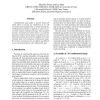Free Online Productivity Tools
i2Speak
i2Symbol
i2OCR
iTex2Img
iWeb2Print
iWeb2Shot
i2Type
iPdf2Split
iPdf2Merge
i2Bopomofo
i2Arabic
i2Style
i2Image
i2PDF
iLatex2Rtf
Sci2ools
ICPR
2010
IEEE
2010
IEEE
Efficient Encoding of N-D Combinatorial Pyramids
Combinatorial maps define a general framework which allows to encode any subdivision of an n-D orientable quasi-manifold with or without boundaries. Combinatorial pyramids are defined as stacks of successively reduced combinatorial maps. Such pyramids provide a rich framework which allows to encode fine properties of objects (either shapes or partitions). Combinatorial pyramids have first been defined in 2D, then extended using n-D generalized combinatorial maps. We motivate and present here an implicit and efficient way to encode pyramids of n-D combinatorial maps.
| Added | 12 Oct 2010 |
| Updated | 12 Oct 2010 |
| Type | Conference |
| Year | 2010 |
| Where | ICPR |
| Authors | Sébastien Fourey, Luc Brun |
Comments (0)

